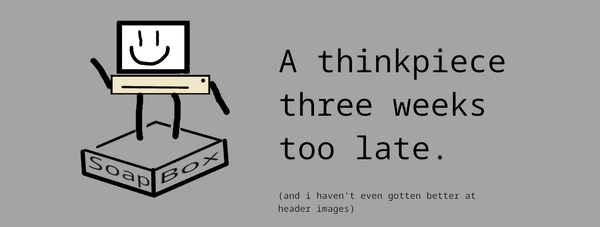Now's not the time to mess with Section 230
I'm not convinced there will ever be a time, but it's definitely not now.

This is an expanded version of a note I am also sending to my Senators and House representative via their respective websites.
If you would like to contact your own Congressional representatives on this issue, you can see https://5calls.org/issue/section-230-censorship/ for background on the topic and a sample script you can use when making a call to their offices or contacting them by other means.
Senator Warren, Senator Markey, and Congresswoman Trahan,
I'm a lifelong Massachusetts resident and a resident of northern Worcester County for the past decade. I'm a career software engineer and a lifelong friend of the open Internet. I'm writing to you each with a concern that we are entering a moment where an open Internet is both uniquely important and under unique threat.
I was lucky to grow up in the early 2000s where I was able to enjoy the open Internet to find communities, build connections, and learn so much about so much. It has been instrumental in my growth both as a human being and an IT professional. And, likewise, I have watched with dismay as the march of consolidation, corporatization, and "platformization" has done significant harm to the Internet. And indeed has done significant harm to society at-large.
The reduction of "the web" to a small collection of billionaire-owned social media fiefdoms where human data and attention is harvested and converted to money for the billionaires - leaving only ads and rage for the human beings - is hugely concerning to me.
With many Americans sharing similar sentiments, it's only natural that our representatives throughout the government have tried to address this. Indeed many members in both the Senate and the House have talked about "keeping children safe from/on social media," "protecting our citizens' privacy," "holding Big Tech accountable," and so on and so on. While they may have different perspectives they're coming from, this is very clearly a bipartisan and bicameral issue.
Unfortunately, much of the legislation proposed or passed - both at a state and federal level - risk further eroding the privacy of Americans, further empowering Big Tech, and destroying smaller service and content providers on the Internet. Not to mention in many cases raising basic questions of constitutionality. Far from protecting Americans (and American children especially) from whatever harmful effects are present on the Internet, they risk restricting access to important forms of information and speech. Most especially risking the ability of marginalized or vulnerable groups to organize mutual aid, share information, etc.
The most widespread of these types of legislation are "age verification" bills, which aim to reduce harm to minors by restricting their access to social media, pornography, or other harmful/offensive material. Currently, 21 states have passed an age verification law and a further 17 have at least introduced them. Many of these come along with unclear or burdensome methods of compliance (especially for smaller service providers) and create significant privacy risk for the users of these services. Many of these have been met with credible legal challenges.
Thankfully, I will say, Massachusetts has not come close to passing one of these laws.
At the federal level, well-meaning legislation such as KOSA, threatens to hand the government a censorship (or at least chilling effect) machine in the name of protecting children. Other legislation like the TAKE IT DOWN Act, threatens user privacy and may disincentivize use of strong encryption.
The news that prompted this letter, though, is the bipartisan push to sunset Section 230, nominally in an effort to "force Big Tech's hand." To force them to "[work] with Congress to ensure the internet is a safe, healthy place for good, or lose Section 230 protections entirely."
This is terrifying to me.
Section 230, which I've written about elsewhere on my blog - and many people much smarter than me have written about at length - is a foundational building block of the Internet. To be sure, it enables many of the negative impacts of the Internet and social media just as much as it does power all of the positive aspects and impacts.
The important thing to keep in mind with any Section 230 discussion is that it protects all service providers and users of those services equally. The common understanding of Section 230 is that it only protects service providers who are distributing the speech of their users. But it also protects those service providers for the "speech" that they exercise in the course of content moderation and service users who may further distribute speech of other users through things such as "retweeting" or sharing a post.
Far from forcing social media platforms to implement better moderation, it will instead disincentivize platforms from performing any moderation, as they can then be held liable for that "speech." This is the reason Section 230 was passed to begin with. Meanwhile, users of these platforms will be at increased risk for spurious lawsuits.
Now maybe, hopefully, you already know all this. If not, please do give a read to someone much more articulate and informed on the topic than I am.
So what makes this particular moment so specifically worrying to me?
First, the bipartisan nature of this effort worries me. I'm worried that this effort will be especially attractive to Democratic members of Congress hoping to "find common ground" and "build bridges" across the aisle during this turbulent time where they may otherwise feel powerless. But sunsetting Section 230, especially without a comprehensive replacement already in place, is beyond irresponsible. Given the current shape of our country and our Congress specifically, there is no reason to think that a reasonable, complete, or comprehensive replacement for Section 230 will be worked out and passed in time.
To be frank, ceding ground like this in what is effectively a single-party government is just asking to get screwed over.
Second, we need a free and open Internet now. While I hesitate to use the cliche, perhaps "now more than ever." We are in a time where our most vulnerable and marginalized populations are under increased (or at least more visible) threat from both their fellow citizens and the government itself. These communities rely on an open Internet publish news, share information, organize protests and mutual aid, connect vulnerable communities, and so much more.
If Section 230 were to disappear overnight, many of these activities would become much more difficult and dangerous, perhaps bordering on impossible. The threat of legal action and the cost of legal defense would threaten to bankrupt smaller companies, non-profits, and individuals even if they haven't done anything wrong. And social media platforms that are already increasingly hostile to these people would become even more dangerous as any sort of content moderation by the platforms becomes more risky. This is another case where, at best, a chilling effect would massively discourage dissenting speech all across the Internet.
Now's not the time. For real. While none of your voting records or policy positions documented on your sites lead me to believe you would fall for this should it reach the Senate or the House floor, it seemed important to share my thoughts.
I'd be happy to talk in more detail about any part of this topic. Or to refer you to resources or people much better and smarter than me.
Thanks,
Norm
p.s. While I did want to share my personal thoughts on this as your constituent, for more information on the topic I really do recommend a read of this much more thorough article by Mike Masnick, who has decades of experience in this space.



![A poorly-drawn cartoon computer with a happy face on the monitor stands next to text: "Don't say tariffs [x4]...oops"](/content/images/size/w600/2025/04/dontsaytariffs.png)
